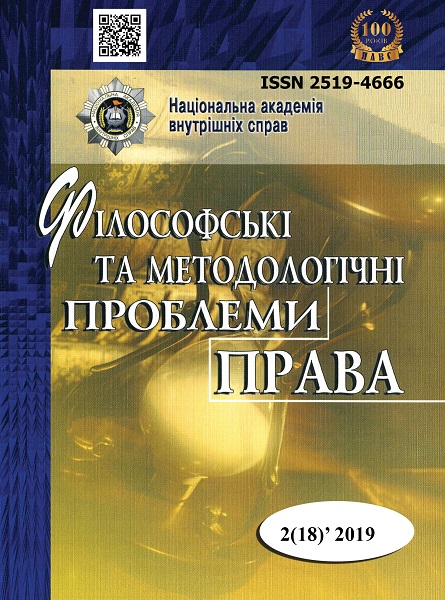Role and Place of the New Elite in the Process of Forming E-Governance
Abstract
The purpose article is devoted to the actual problem of the formation of the national scientific elite. The author emphasizes the fact that in the information age only those whose level of knowledge and intelligence will meet the criteria put forward by techno genic civilization will belong to the elite. Thus, the key role of the scientific elite in the further development of the information society in Ukraine is substantiated. According to the results of the research, the author concludes that only awareness in computer science and other modern branches of knowledge in itself does not make a person elitist. This is a matter of definition. It seems that the signs of elitism must first of all remain high spirituality, nobility, refinement, the interned to be useful to people and their Motherland. Today, despite the destruction of the previous elite strata – the aristocracy and the intelligentsia, it remains to be hoped that the new generation of the elite – scientific – will eventually form and play in the society the positive role it claims to be. Methodology. The benchmarking (comparative analysis based on benchmarks) method has been used to identify sources of major contradictions that are found in the most common methodological approaches to solving the problem under consideration in contemporary literature. Methods of logical modelling, generalization and formalization have been applied in the study of the logical and semantic foundations of the emergence and formation of concepts of «elite» and «elitism» as objective and universal criteria for assessing the role of personality in the development of human civilization. The scientific novelty of the approach proposed in the article to solve the problem under study is that it allows to identify the main sources of contradictions in the interpretation of the essence, content and criteria of evaluating the role of the elitist stratum of human society, as well as to outline ways and means of their solution as in conceptual-theoretical and in legal practice. It is substantiated that the formation of moral and ethical criteria using the methods of formal logic is an effective way of overcoming such contradictions. The logical and semantic basis of such conditions is the requirement that the set of possible situations in which at the same time the whole set of rules of behaviour of the scientific, economic and political elite should not exceed the limits of the sphere of logical «indicator» of empirical confirmation of the relevant criteria formed by the society in the course of human civilization. Conclusions. The logical criteria of the socio-political and moral-ethical nature of the concepts of «elite» and «elitism» allow not only to carry out a clear assessment of the role of the individual in the development of human civilization, especially in the context of the process of formation of information society, but also to substantially rationalize this process and guarantee the use of modern achievements science and technology for the benefit of the public interest.
Keywords: elite; scientific elite; theory of elites; criteria of elitism; information society.
Downloads
References
Cohen, M.R. (1941). The Ruling Class by Gaetano Mosca, H. D. Kahn, Arthur Livingston. Columbia Law Review, 41(1), 177-180. doi: https://doi.org/10.2307/1117220.
Diiesa, Medrano. (2016). American Control Conference ACC Proceedings Article published 2003 in Proceedings of the 2003 American Control Conference. doi: https://doi.org/10.1109/acc.2003.1240402.
Elite Mobility and Elite Rule. The Japanese Power Elite. doi: https://doi.org/10.1007/978-1-349-22993-2.
Fünftes Rosen-Gepüsche Teil 5. (2003). Singende Rosen oder Liebes- und Tugend-Lieder (1654). Poetische Rosen-Gepüsche (1657) (pp. 493-499). doi: https://doi.org/10.1515/9783110931730.2.525.
Haller, Max. (1947). European Integration as an Elite Process. The Failure of a Dream? doi: https://doi.org/10.4324/9780203927304.
Korom, Philipp. (2015). Elites: History of the Concept Chapter July with 4,098 Reads. doi: http:/ s/doi.org/10.1007/978-1-349-22993-2.
Kostytskyi, M.V. (2012). Naukova elita Ukrainy: striltsi prohresu chy strakhovyi rezerv hromadianskoho suspilstva ta derzhavy [The scientific elite of Ukraine: the shooters of progress or the insurance reserve of civil society and the state]. Naukova elita rozvytku derzhav, Scientific elite in the development of states: Proceedings of the
nd International Scientific and Practical Conference (pp. 121-122). O.V. Bykovska, O.V. Lisovyi, S.O. Lykhota, L.L. Makarenko (Eds.). Kyiv: Prymeprint [in Ukrainian].
Kremen, V.G. (2012). Vitalne slovo [Welcome speech]. Naukova elita rozvytku derzhav, Scientific elite in the development of states: Proceedings of the 2nd International Scientific and Practical Conference (pp. 3-4).
O.V. Bykovska, O.V. Lisovyi, S.O. Lykhota, L.L. Makarenko (Eds.). Kyiv: Prymeprint [in Ukrainian].
May, C. (2003). Key Thinkers for the Information Society. (Vol. 1). London; New York: Psychology Press.
Ruigrok, Inge. (2010). Facing Up to the Centre: The Emergence of Regional Elite Associations in Angola's Political Transition Process First published. doi: https://doi.org/10.1111/j.1467-7660.2010.01657.x.
Abstract views: 284 PDF Downloads: 190
Copyright (c) 2020 Philosophical and Methodological Problems of Law

This work is licensed under a Creative Commons Attribution-NonCommercial-NoDerivatives 4.0 International License.
- Authors reserve the right to authorship of their own work and transfer to the magazine the right of the first publication of this work under the terms of the Creative Commons Attribution License, which allows other persons to freely distribute published work with mandatory reference to authors of the original work and the first publication of an article in this magazine.
- Authors have the right to enter into separate additional agreements on non-exclusive dissemination of the work in the form in which it was published in the journal (for example, to post an article in the institution's repository or to publish as part of a monograph), provided that the link to the first publication of the work in this journal is maintained.
- The journal's policy allows and encourages the posting of articles by authors on the Internet (for example, in electronic storehouses of institutions or on personal websites), both before the submission of this manuscript to the editorial office and during its editorial processing, as this contributes to the creation of a productive scientific discussion and positively affects the efficiency and dynamics of citing the published work.




